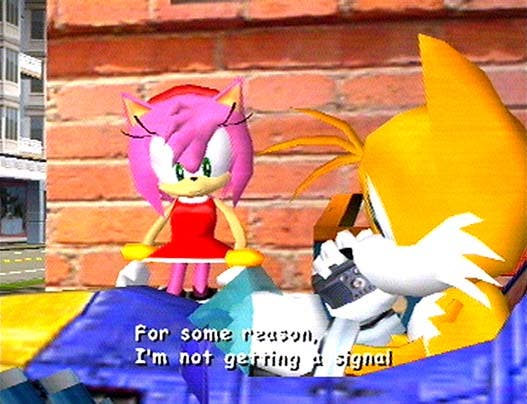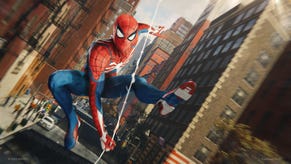Sonic Adventure 2 review
Review - Sega hurl blue hedgehog at ailing Dreamcast once more
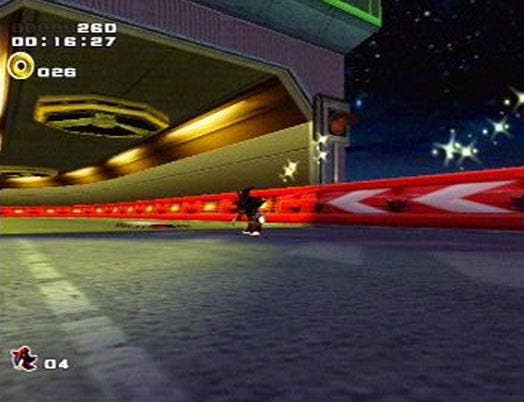
Enter The Hedgehog
You may (or may not, depending on how deep under that rock you've been hiding) know that Sega have been through a lot of turmoil recently, with their shifting business strategies resulting in huge losses, developers and publishers retracting support for the Dreamcast, and an ever looming sense of doom as far as gaming on our console of choice is concerned. However, in the midst of all this gloom come a few beacons of hope which could well set the Dreamcast as a format in good stead for the next year or so. One such glimmer of hope has come in the form of Sonic Team's latest magnum opus, Sonic Adventure 2. The original Sonic Adventure was somewhat of a departure for the famed blue spikeball, with the fast-paced action of previous outings taking a sidestep to introduce more sedate adventure stages, which necessitated the exploration of your surrounding world in order to reveal the storyline at your own pace, unlocking and discovering action phases as you progressed in your adventure. While this proved to be a successful blend of the old Sonic formula and an attempt at a deeper approach to engaging the player, it didn't wholly suit the brand of Sonic as we knew him, and we ultimately missed the all-out action the original formula provided. So with the sequel, Sega have taken steps to provide those players with lashings upon lashings of hair-raising speed and excitement from the outset, but that isn't to say that the notion of depth has been entirely outcast. This is the first Sonic title to actively pursue some kind of decent narrative, instead of the usual blind hunt for the Chaos Emeralds for no apparent reason. The tale dates back to when Dr. Robotnik's (or, as the game irritatingly and consistently refers to him, Dr. Eggman) grandfather, Gerald Robotnik, constructed a huge space colony named ARK, aboard which he was conducting experiments into the secret of immortality. A product of these experiments was a curiously familiar looking creature known as Shadow (basically, Sonic's evil twin). When the military finds out about this project, they attempt to capture Shadow in vain, instead killing Gerald's niece by mistake. Shadow is then consumed by the anger of Gerald Robotnik, and vows to assist Dr. Eggman Robotnik in his continuing attempts to take over the world. Yes, highly cheeseball, but what did you expect? What matters is that although the game takes a considerably linear approach to progress compared to its predecessor, the narrative is driven very well simply with the aid of cut-scenes and clever plot crossovers.
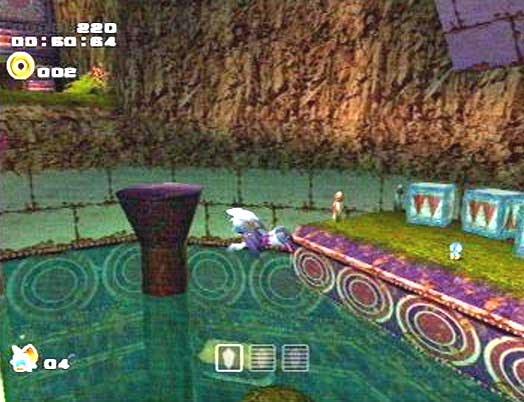
Choose your destiny
At the starting menu, you have the option to play the story in Hero or Dark modes, and each mode proffers three characters for your control. However, you don't choose an initial character to stick with from the start, but rather the characters effectively take it in turns level by level. Obviously, things kick off with Sonic, and kick off they do in spectacular fashion with Sonic boarding down the traffic strewn streets, weaving between cars and leaping off ramps. It's a superb start to the game that really sets the pace and feel for what is to follow, concluding with a manic escape from a marauding juggernaut, somewhat reminiscent of the whale escape in the original. Sonic's levels really are the most joyous to behold within the game, as the ever-shifting dynamic takes you on a frenetic rollercoaster ride of twisting, undulating levels interspersed with monster pummeling platform sections - it's the constant change of pace throughout the entire game that keeps you interested. As the story develops, control is handed over to Tails in his missile equipped mech-suit, in a slightly more slow paced approach to the proceedings which is a lot more Mario 64 than classic Sonic, with the emphasis set greatly on precision platforming action. It's quite refreshing to have a return to these sort of pure gameplay dynamics, yet Sonic Team have enough clever tricks up their sleeves in order to maintain an air of constant surprise and excitement. The third and final "hero" character is Knuckles the echidna, who's missions involve hunting for various emeralds in small, dedicated levels using a bafflingly vague "radar" and a lot of guesswork. Of the three main different types of play, the hunting mode is crushingly dull in comparison to the rest, which is a great shame and stops the game as a whole from escalating into the highest echelons of greatness. If you choose to play the Dark story mode, the proceedings are more or less the same as in Hero mode, with Shadow taking Sonic's role of dashing about like a madman, Robotnik assuming the position of Tales in the platform sections, and new character Rouge the bat doing the hunting. The clever part of all this is that the two modes are following the same story, but the characters switch positions and often locations, occasionally coming across each other in the form a boss section. During cut-scenes, you can witness the actions of the other side from a different perspective, and it all intertwines neatly. Playing both story modes at the same time as we did, you can view the progressing narrative from both perspectives, which really enriches the experience - this way of telling the story reminded me somewhat of the way Half-Life's Opposing Force expansion pack told the same story from the other side's perspective.
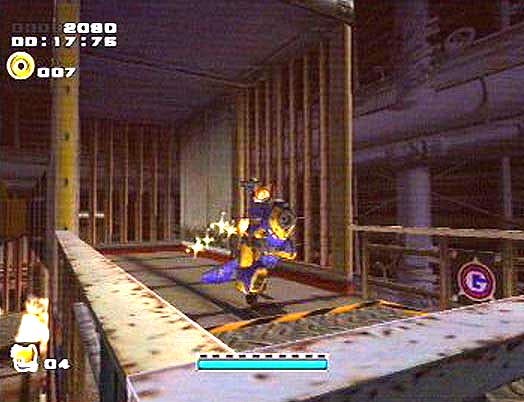
Extra! Extra!
Underneath the huge range of ways to play the game through come the little sub-games and sections which give the title extra longevity and depth, and Sega haven't skimped a bit. For starters, once you've completed a stage proper, you can retry the level again with a different objective. For example, on the first stage the aim is to simply reach the goal. On replaying the level, your objective is to collect 100 rings. Achieve that, and you then have to find a lost Chao creature. There are a total of 5 different missions per level, which adds up to plenty of stuff to do once you're finished with the story. Oh yes, and speaking of the Chao, they've returned once more in their own dedicated section which can be accessed in-between levels, or via the stage selection screen. You can only access the Chao garden between levels by finding a key on the previous level, however, and the advantage to this is that you can crossbreed the animals you find during your mission with your Chao to create an impossibly huge combination of results. But we don't stop there, oh no, there are even more unlockable nicknaks, like a Kart Racing mode where you race against all the other characters on a selection of tracks, and upload your fastest times to a world leaderboard. Unfortunately, the kart racing isn't available in multiplayer for Mario Kart style get-togethers, but the regular games VS modes sort of compensate for this. While not being quite as riotous fun as we'd hoped, the 2-player racing, battle and hunting modes do serve as a pleasant diversion from the single player game for a while.
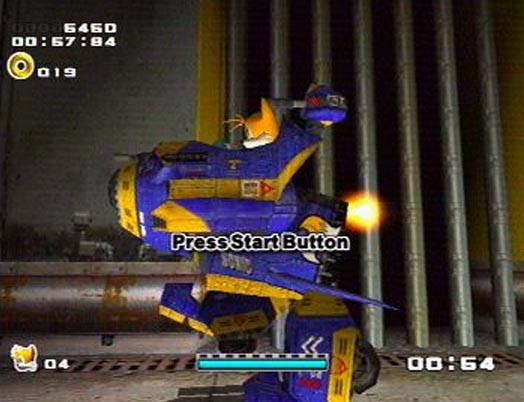
It's all good. Sort of…
Naturally, no game is without its faults, and SA2 is without exception. The largest problem, as with the original, is the dynamic camera. It often switches to the most awkward positions possible, leading to death at the hands of an out-of-view gap, or a monster hidden under a wall which you didn't see because the camera couldn't catch up to your position in time. The trigger buttons to serve to alleviate this somewhat, with the ability to swing it round to your preference, but sometimes it just doesn't budge at apparently random times. Another niggle which surfaced - albeit extremely rarely - was some slightly dodgy collision detection when attacking monsters and trying to hit speed boost pads whilst running - that is, however, an extremely slight complaint. Sonic Adventure 2 is a triumph. Whilst its predecessor was a fantastic game in its own right, it could be a little overbearing with the "adventure" aspect, and with this Sega have gone back to Sonic's roots in style - buy it now.
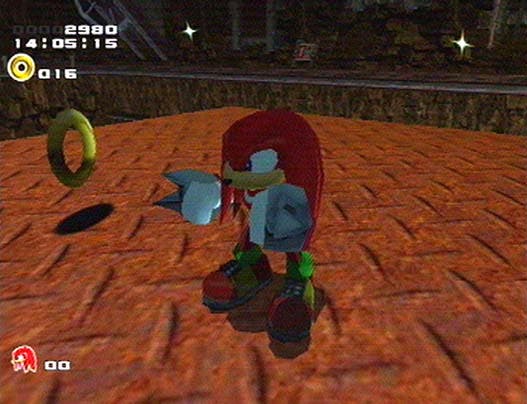
Eye Candy
